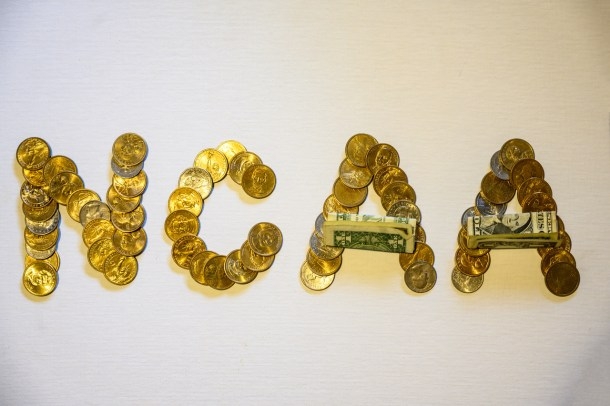
Antonio Ray Harvey | California Black Media
The National Collegiate Athletic Association (NCAA) represents the sports programs at over 1,260 academic institutions, 102 athletic conferences, and more than 480,000 student athletes who have not been allowed, until recently, to make a dime from their athletic abilities or the marketing of their names, images or likenesses.
But last week, the Supreme Court of the United States (SCOTUS) unanimously ruled that the NCAA policy must fall in line with the country’s antitrust laws and that the organization does not have the authority to deny student athletes the right to receive compensation for their athleticism or fame.
“I’m excited about this ruling. It’s long overdue and I am happy that California had a small role in moving that tide, that marker,” said Sen. Steve Bradford (D-Gardena), who, along with Sen. Nancy Skinner (D-Berkeley) introduced Senate Bill (SB) 206 or the Fair Pay to Play Act in California.
SB 206, which Gov. Newsom signed into law in 2019 – and which is scheduled to take effect on Jan. 1, 2023 – paved the way for athletes in the Golden State to cash in on apparel endorsements, autograph signing, jersey licensing, social media commerce, ticket sales or other for-profit ventures.
Speaking during a Juneteenth celebration at the Secretary of State office in Sacramento, Bradford said, “It’s really what we were talking about here today. College athletics is an extension of the chattel system. Those athletes are people of color — African American men and women — who have never been fully compensated.”
About a week after the Supreme Court’s landmark decision, the NCAA, based on recommendations from the organization’s Division 1 Board of Directors, announced that it would lift its restrictions on student earnings and allow students to profit off of their athleticism and fame.
That organization’s decision came a day before laws lifting the NCAA ban in eight states – Alabama, Florida, Georgia, Kentucky, Mississippi, New Mexico, Ohio and Texas – took effect July 1.
According to the NCAA, the temporary action would remain in place until federal legislation or new NCAA rules are adopted.
After the NCAA decision, Steve Berman, managing partner of Hagens Berman and co-lead attorney for a class action suit, Keller v. Electronic Arts Inc., that helped shift the ground on the student athlete pay issue, shared his thoughts.
Berman told California Black Media, “this set of rules argues that the fate of college sports is not seriously in jeopardy if the NCAA were to get out of the business of fixing NIL (Name, Image and Likeness) prices entirely.”
“The NCAA is admitting what we’ve known all along: that consumer demand is not tied to athletes’ earnings, and for many reasons, college sports can have a future that is both fair and sustainable for athletes,” he continued.
In the Supreme Court case, the National Collegiate Athletic Association v. Alston (No. 20-512), U.S. Justice Neil Gorsuch delivered an opinion in the 9-0 unanimous ruling.
Gorsuch wrote, “Colleges and universities across the country have leveraged sports to bring in revenue, attract attention, boost enrollment, and raise money from alumni. That profitable enterprise relies on ‘amateur’ student-athletes who compete under horizontal restraints that restrict how the schools may compensate them for their play.”
The NCAA, he continued, “issues and enforces these rules, which restrict compensation for student-athletes in various ways. These rules depress compensation for at least some student-athletes below what a competitive market would yield.”
The lead plaintiff in the case the Supreme Court decided, Alston v. NCAA, is African American Shawne Alston, a former University of West Virginia (UVW) running back. Alston played for the Mountaineers from 2009 to 2012.
Alston’s landmark ruling may have led to the biggest rewriting of NCAA rules in the organization’s 115-year history, but it was Ed O’Bannon, who first brought a legal complaint against the NCAA, over the compensation of former and current student-athletes.
O’Bannon, who won a NCAA Men’s Basketball title with the University of California Los Angeles (UCLA) in 1995 filed the federal class-action lawsuit, O’Bannon v. NCAA, 12 years ago. He and 19 others athletes sued the NCAA for violating federal antitrust laws.
National Basketball Hall of Fame inductee Oscar Robertson affixed his name to O’Bannon’s suit in 2011 when he learned that the NCAA used his image in licensing deals with trading card companies without his knowledge.
The distribution of trading cards displayed Robertson wearing his University of Cincinnati uniform, where he played for the Bearcats from 1957 to 1960. The NCAA claimed it could use his likeness in perpetuity, Yahoo! Sports reported in January 2011.
“Today, the Supreme Court said, ‘no’ to the NCAA’s monopolistic practices,” Skinner said of the NCAA v. Alston ruling. “For far too long, the NCAA has pocketed billions off the hard work and talent of student-athletes while limiting the support colleges can provide and denying athletes any of that wealth.”
In 2009, Sam Keller, a former starting quarterback at Arizona State University and the University of Nebraska, brought a putative class action lawsuit (along with other former college football players) against Electronic Arts (EA), the digital interactive company, alleging that its use of his likeness in the NCAA Football series of video games violated his right of publicity under California statutory and common law.
On July 31, 2013, California’s Ninth Circuit Court of Appeals in California, ruled EA was not protected by the First Amendment free speech in portraying the likeness of a college football player. The ruling effectively ended the NCAA Football video series run of 17 years.
Although the SCOTUS and NCAA decisions affirm California’s law on student athlete pay, the U.S. Congress has not yet created a national legal standard on the issue.
Bradford said he was surprised by the decision coming from a Supreme Court bench with a conservative majority.
“Yes, I was surprised the ruling was unanimous. That fact impressed me far more than anything else,” Bradford told California Black Media. “Regardless of it being a conservative court, I think when the facts are just laid out so obvious — Nick Saban (Alabama head football coach) getting paid $9 million a year and many college athletes still hungry before they go to sleep.”
Now, Bradford and Skinner are working to move up the effective date of the legislation with another bill the duo introduced in December of 2020, SB 26.
“As an author of Fair Play To Play, SB 206, now SB 26, we’ll move up that date,” Bradford said. “Just because you have a scholarship, it doesn’t come close to covering your living expenses” he said. “(Student athletes) should be able to monetize their likeness just like any other student and any other American under the First Amendment.”






